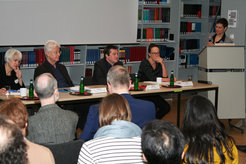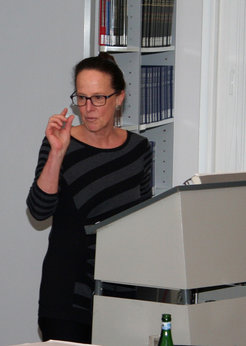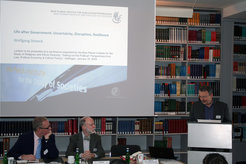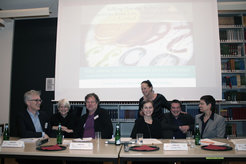“Let the Conversation Begin”
THE FIRST ANNUAL GOETHE-GÖTTINGEN CRITICAL EXCHANGE
"Selling Out the Political?: Perspectives from Law, Political Economy & Critical Theory"
January 15, 2016 | Library Hall at MPI-MMG, Göttingen
A summary by Stefan Schlegel
It was a conference and a celebration at the same time – a celebration of the inauguration of the Ethics, Law and Politics department of the Max-Planck-Institute for the Study of Religious and Ethnic Diversity. Its director, Ayelet Shachar, said she was delighted to officially commence the activity of the new Department with such an impressive line-up and a full house in the library hall of the MPI MMG.

The Conference was co-organized by Rainer Forst, Co-Director of the “Cluster of Excellence on the Formation of Normative Orders” at the Goethe University Frankfurt. A considerable delegation of the Cluster of Excellence came to Göttingen for the occasion. When Ayelet Shachar launched the conference with the words “let the conversation begin” she therefore not only referred to the day´s conference but to a prospective long term exchange between the MPI in Göttingen and the Cluster of Excellence in Frankfurt.
The topic chosen for a celebration was a daring one: “Selling out the political? – Perspectives from Law, Political Economy and Critical Theory”. The subject of the shifting relations between the sphere of the state and the sphere of the market has become very pressing in different fields of life and subsequently in different academic disciplines, said Ayelet Shachar in her opening remarks. And not all the important voices in the field are very optimistic. “Some of today´s papers are depressing in their tone”, she remarked. It would turn out during the day that the lively format of a keynote speaker and two discussants on each of the three panels is perfect for an in-depth and stern analysis of the state of the political sphere in today’s world. The uplifting outlook contained in discussants’ responses balanced the debate and shaped it to be fruitful and challenging.
Neoliberalism Contra Democracy: Ten theses

Wendy Brown, Professor of Political Science at Berkley was the keynote speaker of the first panel (chaired by Peter van der Veer, MPI MMG, Göttingen). She developed ten theses on how neoliberalism affects democracy. Her attempt was not to synthesize, but rather to list different accounts of how democracy is challenged by neoliberalism. In ten short chapters with a different perspective each, she drew the picture of a postwar political compromise, the “unhappy marriage of capitalism and democracy”, under constant pressure from neoliberalism which she defined as the mantra: “less state, not more. Where the political was, markets shall be.” The unfolding results, she stated, are a subversion of democracy to economy, the replacement of equality by liberty, an attack on the general will, the incitement of populism on the political right as well as on the left, extreme material inequality that proves to be toxic for democracy, a financialization that tends to embed states within the market rather than markets with states, and a replacement of genuine political debate by autocratic and technocratic discourse. In illustrating her theses, Wendy Brown drew heavily on recent developments in the EU, especially in Greece. She described the EU as a political institution without a political body: “The EU is basically a mighty macro-economy with a central bank”, and “the democratic deficit of the EU is not an accident. It is endemic.”
“Nobody fuses the insights of Foucault (and others) with such a clear normative democratic stance, as Wendy Brown does”, said Rainer Forst,who was the first discussant. His remarks questioned the nature of democracy whose loss Prof Brown bemoaned: whether it is historical, normative or purely aspirational. Prof Forst further warned against mono-causal explanations of social changes and against a transfiguration of democracy as it used to be, especially in the light of its relationship with colonialism and its effects abroad. “The good old days of social democracy were good old days not everywhere.” He concluded by casting doubt on whether a democracy that truly controls the market has ever yet to be created, and posited that such a future democracy might have to be a transnational one.
Melissa Williams, Professor of Political Science at the University of Toronto, also replied to Prof Brown’s theses with a more optimistic outlook. It was too soon to write off the demos, she insisted. “Neoliberal power is not all in one place, so isn´t democracy.” She described various civil society democratic movements and networks around the world that show clear patterns of transnational cooperation in their protest. “We will gain a lot if we look at new and transnational forms of democratic movements. The demos is not undone. It needs redoing.”
Wendy Brown remained skeptical: “Is network power our best friend?” she asked. “Democracy has to have a place. It has to have a ‘We the People’”.
Capitalism Unchained?

The second panel (chaired by Darrel Moellendrof, Goethe University Frankfurt, Normative Orders) neatly built upon the previous discussion. Keynote speaker Wolfgang Streeck, Max Planck Institute for the Study of Societies, Cologne), referred to Wendy Brown: “She frequently shows me what I said, what I should have said and what I still have to learn about.” He unfolded his thesis of a “Life after Government: Uncertainty, Disruption, Resilience.” He claimed that we live an under-institutionalized way of life and that we currently witness a sort of interregnum: “The old age has died but a new one has yet to be born,” he said, referring to the postwar period. Nobody was in doubt back then that capitalism had to be governed and that popular support for capitalism needs to be ensured by redistribution. This era ended in the 70ies, when the Keynesian approach to raising wages in order to enhance consumption was replaced by a Hayekian approach to protecting wealth in order to enhance investment. The result, Wolfgang Streeck said, was capitalism unchained by the state and therefore less stable. He likened the current situation to the interwar period and depicted current society as a community of consumers, kept in a good mood by “coping, hoping, doping, and shopping” to sustain unreasonable expectations for a better future.
Christoph Engel, Max Planck Institute for the Research on Collective Goods, Bonn, responded to this grim outlook with a painting of the Apocalypse. “Are we all going to hell?” he asked and then pointed to some specks at the horizon that seem to be a little bit brighter. If we look at income instead of wealth, he said, current inequalities are not quite as disturbing, and technological innovation has helped to solve problems that seemed to be unsolvable in the past.
Andreas Busch, Professor of Political Science at the University Göttingen replied along the same lines. Wolfgang Streeck was a little like a magician, he joked, able to conjure up a reality and to make things disappear. Among the things that had magically disappeared from the picture, was regulation, Andreas Busch argued. We live in a golden age of regulation and witness a massive increase of regulating agencies; in today’s age, we witness the result of freer markets as well as more rules. He also emphasized the decline of global poverty and voiced his discomfort over the fact that in Wolfgang Streeck`s narrative, everything seemed to happen without actors. As if the unhappy marriage of the state and the market was dismantled by blind, purposeless forces, rather than by agents with specific interests.
Wolfgang Streeck himself objected to some of the brighter signs elaborated in the discussion and doubted the additional indicators change the big picture. He was looking for a proposition of how to simplify the variety of observations in a complex world, he explained. Even in 1938 one could have pointed to some positive developments, he said. But would that have been very meaningful?
Putting a price tag on Citizenship

The third panel, chaired by Peter Niesen, University of Hamburg, moved from abstract to the concrete, considering a specific case of the shift between the spheres of political and the economic. Prof Ayelet Shachar presented a chapter of her forthcoming book “Olympic Citizenship,” to be published by Oxford University Press. In her presentation, she investigated the development of a thriving market for citizenship. “Scholars of immigration law have been focused on the restrictive turn, on the ever higher obstacles to mobility faced by the many. But no less revealing are the exceptions for the few,” she said. The development in this field have been dramatic. When Nobel Prize laureate Gary Becker suggested in the early 90ies to auction-off entry permits, nobody took the idea seriously. Yet the logic of commodification, Prof Shachar showed, has lately gained enormous ground in the field of citizenship, with more and more countries offering citizenship in exchange for fees or investment.
What started out as a shady business of small Caribbean island states, has since become a brewing trade in what was previously seen as sacrosanct: the political relations of citizenship. This development meanwhile has arrived in the heart of Europe, in Canada and Australia, raising profound legal and ethical puzzles: what happens to the demos when the logic of capital gains influence in shaping the criteria for defining who belongs, or ought to belong, in the circle of members? What, if any, are the moral limits of markets? There is an important difference between the fast track scheme to citizenship, reserved for exceptionally talented individuals like athletes and scientists in the global race for talent, and the sell-off of passports, Ayelet Shachar argued. While the first still demands a presence in the country of choice, still requiring the lucky few to become members of a community, citizenship and community become detached from each other where passports are simply given away in exchange for money. This development risks to corrupt the idea of citizenship as grounded in principles of equality and participation, Prof Shachar argued. To put a price tag on the good may ultimately change the nature of the good itself, she warned. It may well raise the question of who is entitled to citizenship in the first place, and according to what principles. “Will you own your membership? Will you be able to afford it?” she asked.
Sarah Fine, King´s College, London, could for once not contrast the keynote with a more optimistic outlook. Prof Shachar’s research showed how the level of inequality in the world is ultimately infesting goods like citizenship that were previously non-market goods, she said. This risks to turn access to community into an exclusive and exclusionary asset, she pointed out.
So the role of the more optimistic counterpart was left over for the Historian Martin van Gelderen, of the Lichtenberg-Kolleg, Göttingen. He pointed out that in early modernity it was common for cities to sell their citizenship to wealthy travelers looking for security and the rule of law. He further raised the question whether the commodification of citizenship – problematic as it may be – could not contribute to the demystification of citizenship and whether this could not be seen as an unintended progress.
When time was running out at the end of the day and the lively debate had to be interrupted, it was good to know that this was just the beginning of a great conversation!
Stefan Schlegel is a Research Fellow at the Department of Ethics, Law, and Politics at the Max Planck Institute for the Study of Religious and Ethnic Diversity.



